Cloudscapes at MOT by Tetsuo Kondo Architects and Transsolar
Japanese studio Tetsuo Kondo Architects teamed up with environmental engineering firm Transsolar to encase a cloud inside this transparent two-storey cube (+ slideshow).
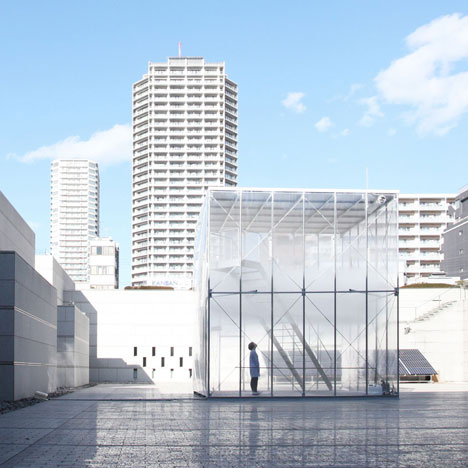
Tetsuo Kondo and Transsolar previously collaborated to produce an indoor cloud at the Venice Architecture Biennale 2010 and this second Cloudscapes installation recreated the experience in the sunken courtyard of the Museum of Contemporary Art Tokyo (MOT).
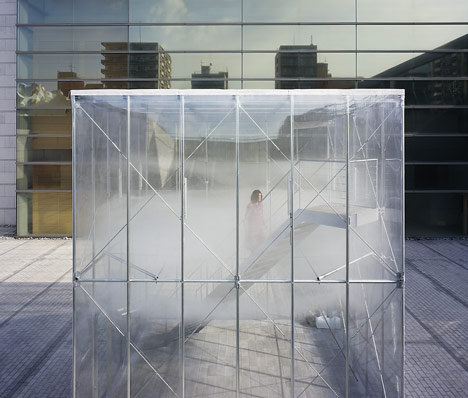
The cloud effect was formed by pumping three layers of air into the space. Cold dry air went in at the bottom, while hot humid air was fed into the middle and hot dry air was pumped in at the top.
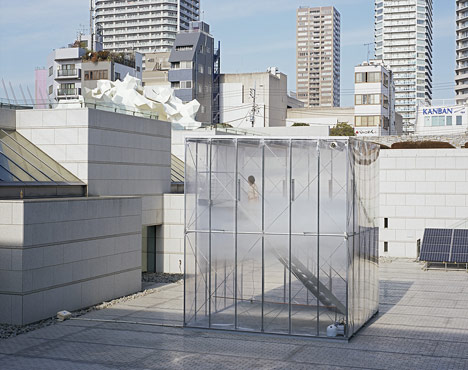
This produced a canopy of clouds at the centre of the cube, which visitors could climb through using a central staircase.
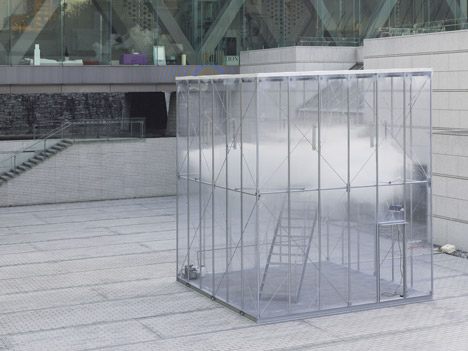
"The temperature and humidity inside the container are controlled to keep the clouds at their designed height," explained Tetsuo Kondo.
The transparent cube surrounding the cloud was built from a framework of metal tubes, with cross bracing that allowed the structure to respond to outside wind pressure.
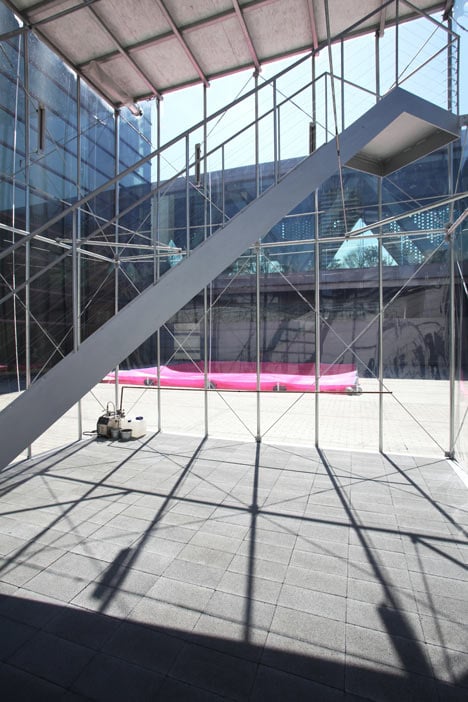
"The edges of the clouds are sharp yet soft, and always in motion," added the architect. "Their colour, density and brightness are constantly changing in tune with the weather and time of day."
Tetsuo Kondo Architects also recently completed a family house that looks like a stack of cubes on the outside, but opens up inside to form one big bright space. See more design by Tetsuo Kondo »
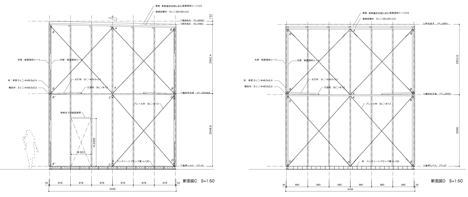
Clouds have featured in a couple of recent stories on Dezeen, including an art installation in a beaux-arts style room and a prefabricated holiday home. See more weather-themed architecture and design »
Here's a project description from Tetsuo Kondo:
Cloudscapes at MOT
We created a small bank of clouds in the Sunken Garden of the Museum of Contemporary Art Tokyo. The clouds billow softly in a compact, transparent container and can be seen from the entrance hall, exhibition galleries, outdoor plaza, and other parts of the museum.
Climb the stairs inside the clouds' container. When you climb beyond the clouds to reach the top, the museum, the surrounding buildings, and the sky stretch out above the clouds. The edges of the clouds are sharp yet soft, and always in motion. Their colour, density and brightness are constantly changing in tune with the weather and time of day. The temperature and humidity inside the container are controlled to keep the clouds at their designed height. The air inside the container forms three distinct strata, one cool and dry, at the bottom, a warm and humid middle stratum, and a hot and dry stratum at the top. The warm, humid layer is where the clouds form.
The transparent container is constructed of 48.6 millimetre diameter pipe. The elastic material added to the mid region, at a 6 metre ceiling height, makes the structure as a whole responsive to wind pressure. That elastic material also makes it possible to build the transparent container of nothing but thin pipes. The double layers of vinyl sheets dividing the strata ensure stability of temperature and humidity inside the structure.
The constantly changing clouds are both soft structures and part of the natural environment that surrounds us. It is not the structure alone but the invisible differences in humidity and temperature and the weather, the time of day, and other aspects of the surrounding environment, all influencing each other, little by little, that make this work an artistic whole.
Cloudscapes is, in effect, an experiment in creating a new type of architectural space, one that achieves integration in engagement with its environment.
Collaboration with Transsolar (Nadir Abdessemed, Jakob Merk and Matthias Schuler)
Location: Museum of Contemporary Art Tokyo, Tokyo, Japan
Program: installation
Completion period: December 2012
Architect: Tetsuo Kondo Architects
Structural Engineer: Konishi Structural Engineers